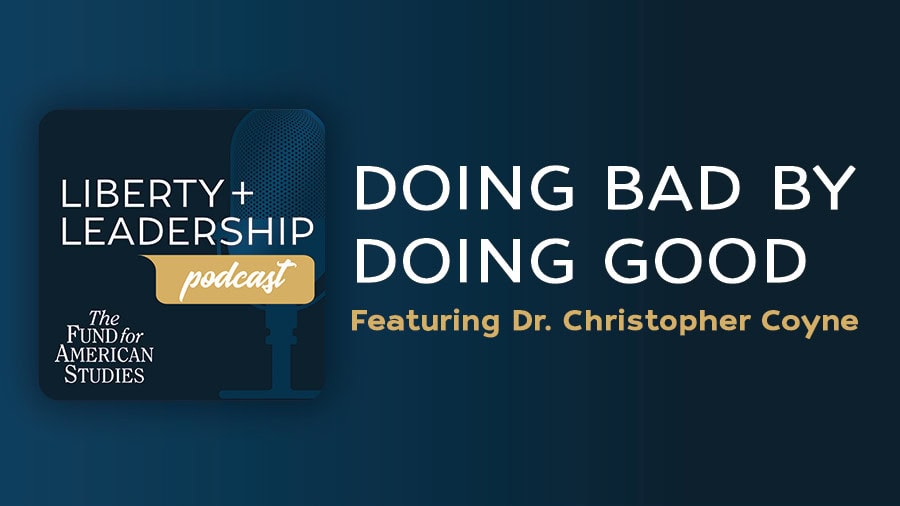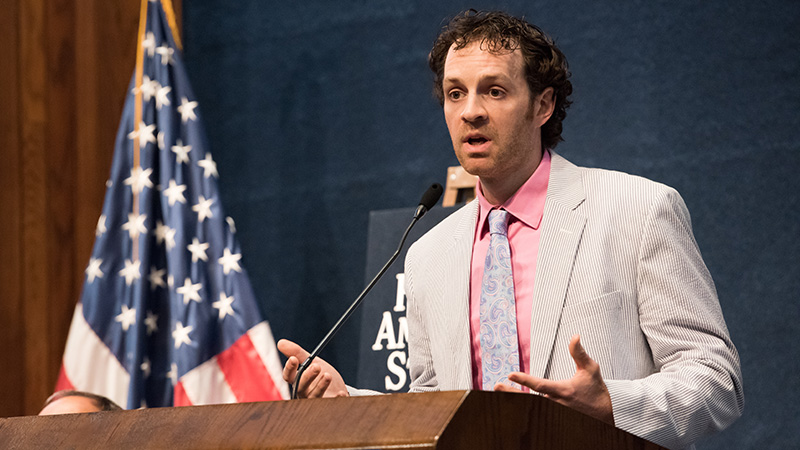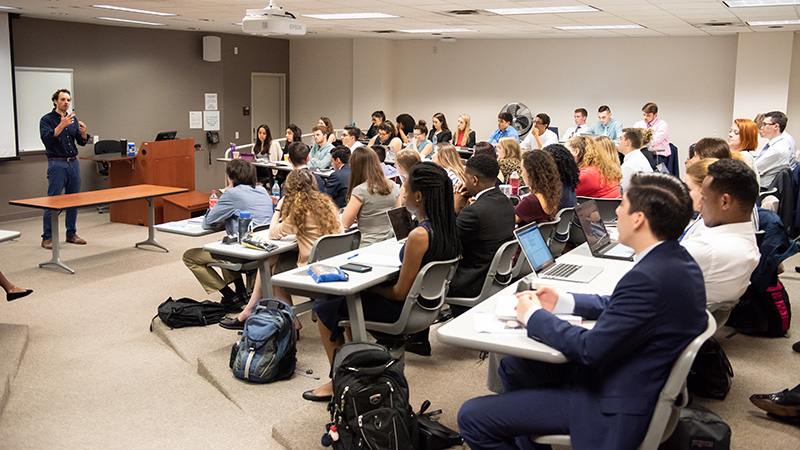

Economist Dr. Christopher Coyne joins us for a discussion on why state-led humanitarian efforts and regulations that intend to do good, often end up doing harm. Dr. Coyne uses economic analysis to examine the limits of state aid during times of crisis, including the current COVID-19 pandemic.
Dr. Christopher Coyne is the F.A. Harper Professor of Economics at the Mercatus Center at George Mason University and a professor of economics for The Fund for American Studies (TFAS). You can listen to our conversation above or read a transcription below.
This episode was released this week on the TFAS “Liberty + Leadership” Podcast. To never miss an episode, subscribe

on Apple, Spotify, Stitcher, Google or your favorite podcasting app.
This episode was recorded on Wednesday, April 22. Some examples may become outdated as the COVID-19 response evolves.
I want to talk to you today about humanitarian aid. We are in the midst of a pandemic. People around the globe are concerned about their health and safety as well as how to earn money to provide for their families. In so much of the world, people are looking to the state to provide aid. However, you wrote a book entitled “Doing Bad by Doing Good,” which uses economic analysis to demonstrate why state-led humanitarian efforts that intend to do good often end up doing nothing or causing harm. I want to dig into that book a bit, because it’s very timely, and talk about how its lessons can be applied to the situation that we find ourselves in today. My first question for you is, why economics? What can the economic way of thinking teach us about the limits of state-led humanitarian action?
Dr. Chris Coyne: Well, the economic way of thinking is extremely important for thinking through what is possible and what is feasible when we’re trying to help people who are suffering. And the reason it’s central is because it helps us understand what can and can’t be accomplished, but also the conditions that are necessary to successfully aid people who are suffering because of some kind of crisis. Many humanitarian discussions, whether it’s with the current pandemic or with other humanitarian issues around the world, oftentimes emphasize the moral aspect that we must do something. You should help people in need and so on. And that’s very important. The ethical or moral component is extremely important to this. And as human beings, we all feel sympathy for our fellow human beings when they’re suffering. The issue from an economic standpoint is that even though we want to help people, it doesn’t necessarily mean that we can. What economics helps us do is think through what can be done.
And, the reason that’s important is it can then help inform what should be done. So let me give you an example. Someone might say, we really need to help people that are suffering. So we’re going to provide them with this type of aid or assistance. And that might help them, but it also might make things worse off for them. And we can talk about some examples of that later on, how it might actually harm people it intends to assist. So where that’s the case, economics can help clarify that. When it’s the case that aid that is intended to help people actually ends up harming them, probably the best course of action is to refrain from doing that. And so, what economics can help us think through are things like the fact that we face scarcity constraints. We only have so many resources and we have to figure out how to allocate those to help people.
We face knowledge constraints. People that are suffering right now in America are suffering in many different ways. Even within a geographic area or state, they suffer very differently. People for instance, in upstate New York, are suffering differently than people in New York City. And so, we need to think about how different policies affect people differently. Then, of course, there’s the issue of incentives and economics. Incentives are front and center and incentives refer to the fact that people change their behavior in response to costs and benefits. And that goes both for policymakers as well as for the recipients of aid and assistance. Economics can help us think through that all with the goal of helping people in need. One of the things I think is really important to clarify is that many people view economic issues as somehow separate from humanitarian issues.
They’ll say, well, economists are just concerned about selfishness or money or profits. But nothing could be further from the truth. Economics helps us think through what can and can’t be accomplished, which is central to providing effective solutions to human suffering. And so that’s really what I try to do in the book and what I think is really necessary for today as well. Given the policy options before us and given the problems we face with the COVID pandemic, what can and can’t we accomplish? And answering that question first is crucial to then figure out what the best types of policies are and how those policies need to be adjusted as conditions change.
In your book, you use some historical examples of well-intentioned aid programs that failed to deliver on providing effective solutions. Can you draw any parallels from these past mistakes to what you are seeing today? Are there lessons we should be taking from past efforts?
Dr. Coyne: Certainly. There are a couple of things that I would highlight. One is that any time the state gets involved with something – and this varies depending on the level we’re talking about, the state level or the federal level – it typically has blanket policies that affect all people within whatever geographic area it’s responsible for. And that can be potentially good in some areas, but in other areas – especially when it comes to things like the current pandemic – it’s problematic from the standpoint that it treats the solution as if it’s a one size fits all. So there’s kind of a top-down, one size fits all solution that’s imposed on everyone. And this is problematic for a few reasons. One is. I mentioned earlier, it neglects the fact that there are different problems facing different people in a geographic space.
I mentioned upstate New York and New York City before but where we’re located in Northern Virginia, it’s a very dense area. The problems facing folks here are extremely different from the issues facing folks just a couple hours south of us in Southern Virginia, which is much more rural, much of it is a lot less dense in terms of population. And so, what you want ultimately is a diversity of responses to comport with the local conditions that people are facing and suffering from. The other problem with a top-down type approach is that it neglects experimentation with different solutions. When a government passes a blanket lockdown order and says, these businesses must stay closed or people must stay inside, what that prevents is different people experimenting with coming up with different solutions to address the issues that they are facing at a local level. That’s one insight. The fallacy of a one size fits all.
Another issue that we can kind of take and extrapolate from historical instances is the importance of incentives and feedback mechanisms. This is the idea that people are imperfect in all walks of life in humanitarian issues and for-profit firms and nonprofits. We’re imperfect people, which means we’re going to make mistakes, and that’s okay. That’s just a social constant in human life. The issue is we need to have both feedback – meaning you know you’re making a mistake – and an incentive to adjust your behavior in the face of making a mistake, in the face of making an error. And one of the things we need to be cognizant of when we’re concerned about helping people that are suffering is making sure that feedback mechanisms and incentive mechanisms exist so that people can adjust their behavior. And so again, when you have a large scale bureaucracy imposing solutions, it makes it very difficult to adjust quickly because government bureaucracies by their nature tend to be very slow-moving and face great inertia and change.
And that can be problematic when there are conditions that are changing rapidly as in the case with the current pandemic. The other thing that economics can help us think about and we can extrapolate from past experiences is the idea of unintended consequences. So this is the idea that when you intervene into a complex system, it’s going to generate outcomes and consequences that you couldn’t anticipate at the time of the intervention because people respond to incentives. Let me provide you with a couple of examples of this that are readily apparent right now, one domestic and then one international.
A domestic example is that in numerous places throughout the country, the unemployment insurance that is being offered under the new or the most recent stimulus plan – the state-provided benefits and federally provided benefits – are as much as or more than workers can earn by being employed in a job.
So what do I mean by that? Well, I was reading an article the other day about a local business, I forget the location, somewhere in the United States, but this business owner was saying she ran a coffee shop, it wasn’t a chain, and she was employing workers and she was actually paying them a higher wage than they otherwise would have gotten. It was something like $10 or $11 or maybe $12 an hour. She was saying that she was having trouble keeping the workers not because she was laying them off, not because they’d gotten sick, but because the unemployment benefits totaled the equivalent of $14 to $15 an hour. And so, those employees were better off staying home as compared to working for her.
Now, why is that problematic? While on the one hand keeping this business operating was providing a service, coffee to consumers and to first responders, that was part of what this business owner was doing. But also in terms of economic recovery, what you want is people working and when you provide a disincentive to work, that creates a problem. The unintended consequence here is that in an effort to help people that are suffering because they’ve lost their jobs through increased unemployment benefits, some of those people are helped, but you also incentivize people who otherwise would have worked to no longer do so on the margin.
Another example of unintended consequences: The United Nations released a report, I want to say one to two weeks ago, saying that several hundred thousand children around the world will die due to increased poverty. So what’s the cause of that increased poverty? And this is beyond, of course, the deaths due to the pandemic itself – the cause of this poverty is the economic downturn due not only to the government-imposed shutdown in America, but in numerous other countries as well. So one of the unintended consequences of shutdowns in various developed countries, and underdeveloped countries for that matter, is to impoverish extremely marginalized people who are already just getting by, if you will, just surviving and causing them greater suffering, if not death.
These are all unintended consequences that we want to think about. Again, the idea being that our efforts to help people that are suffering might very well end up hurting those people or other people as well, many of whom are extremely marginalized already. And so, we want to think through that. Given our shared goal of helping those who are most in need.
You recently signed an open letter from the Independent Institute asking the Governor of California to suspend Assembly Bill 5, a recently passed law, which regulates the use of independent contractors in the state. Why are you asking the governor to roll back this law during COVID-19?
Dr. Coyne: So this is a very good example of how a regulation that existed prior to the pandemic can have real effects on human well being. In this case, I would submit for the worst. As you mentioned, California Assembly Bill 5, or it’s often referred to as AB-5, it dealt with how workers are classified. Basically it said that instead of classifying workers as contractors, they needed to be classified as employees. There are exceptions, but the norm is that you would classify contractors as employees. And of course, this especially matters for people in the gig economy – people that are Uber, Lyft, those types of employment opportunities. Proponents of this bill, when it was passed, said that it would benefit workers because it would give them labor protections by classifying them as employees instead of contractors. They would be subject to minimum wage laws, to sick leave, to worker’s comp, to unemployment insurance and so on, which would benefit them.
That was the idea. But of course, like any regulation, what it does is raises the cost of employing people. So the cost of doing this – those that get to keep their job might benefit by having these workers benefits, labor benefits, but the employer has to pay a higher cost now to employ people. So why does this matter in the face of the pandemic? Well, of course, there is widespread unemployment and the regulation makes it more difficult for people to work. And it makes it more difficult for people not just to work, but to provide value-added services to their fellow human beings, many of whom are suffering.
To provide an example, The Los Angeles Times had an article on this in late March. And I liked the article because it starts with the story of a worker who lives in Los Angeles. And, during normal times, she puts together several different jobs in order to make a living. If I remember, she was a voiceover actor; she was a yoga instructor; she had a bunch of other jobs. I think she was a home organizer as well. She was able to piece together the different jobs in order to make a living. Well, of course, now with the COVID outbreak and the stay at home order, she can’t do those things. She can’t be a yoga instructor. She can’t do home organization and so on. She doesn’t have an income. And so, what she had tried to do was to sign up for a website called rev.com that does transcribing. They transcribe audio clips and she said, okay, I can do this from my home. I can sit at my computer, I can transcribe audio clips and I can earn some income.
She was rejected from doing this by rev.com because she would have had to be classified as an employee instead of as an independent contractor. And so, you can see how in that instance a regulation that even if it’s driven by the best of intentions to protect laborers in normal times and to help them, it actually in the case of a crisis like we’re in right now, it actually makes people worse off – both the person who could earn an income, but also other people that they could assist.
If you think about the people that can avoid the harm of regulations, typically it’s wealthy people. That is, they have enough income to survive if they are not earning any income and they have various ways of getting things – getting food, getting supplies, and so on because they can afford to pay people.
If you’re relatively poor, you have less opportunity to earn income, number one, but also to access different markets to get goods and services that you might need during the time of the lockdown. And so, by artificially making it more difficult to work, this regulation is harming people both directly and indirectly. My colleagues and I, by colleagues, I mean the other 150 economists and political scientists who signed this open letter for Governor Newsom to suspend AB-5 during the crisis. What we were trying to emphasize is by suspending that regulation, it will empower people to number one, earn an income themselves to better themselves, but in doing so also assist their fellow human beings who are also suffering greatly because of this.
To extrapolate a little and to link it back to what I had said earlier, one of the takeaways here is during times of crisis like this, one of the pieces of low hanging fruit that policymakers might consider is looking to remove and ease regulations which are precluding people from engaging in voluntary exchange with other people, whether it’s through employment, whether it’s through exchange or other forms of engagement. Because allowing people to voluntarily interact with others is a sure-fire way to allow them to improve their situation. It doesn’t alleviate the root cause, it doesn’t alleviate the pandemic or the virus that is causing all this, but it does ease the burden and the suffering that they’re facing due to that. And so that would be one readily apparent policy implication of all of this.
You can listen to the full episode by subscribing to the TFAS “Liberty + Leadership” Podcast on Apple, Spotify, Stitcher, Google Podcast or your favorite podcasting app.

